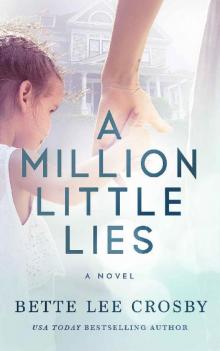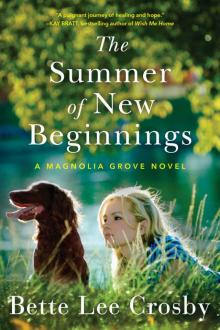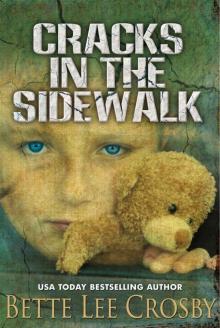- Home
- Bette Lee Crosby
Blueberry Hill Page 2
Blueberry Hill Read online
Page 2
That July we started our baby-sitting business with more than forty kids, and I was raking in a whopping two hundred bucks a week. I saved most of my windfall. Of course I did; that’s the kind of person I am. Part of that money went into a college fund, and the rest was set aside to buy new clothes for school.
Donna treated her friends to ice cream sodas, movies, and even a day at Palisades Amusement Park. Come September, she didn’t have a dime left.
What can I say, we were different people.
Sometimes I wish I had been a little more like Donna. She did what she wanted to without caring about who liked it and who didn’t. Not me. I worried about everything, including the possibility of becoming a social reject because I was still walking home with Fatty Patty.
A Time of Rebellion
I was fifteen when I discovered the next best thing to being Donna was having her for a sister. Granted, we were an unseemly pair, her in blue jeans and leather jacket, me in head-to-toe pink. Standing next to Donna, my narrow shoulders and small stature ran a poor second to her tall athletic build. With almost two years difference in our ages, I had the advantage of being older; she had the advantage of being bigger. This resulted in a long-standing argument as to who was the “big sister.”
I can’t begin to count the number of times I wished to be Donna. From time to time I would dress in her clothes and sashay across the room, looking to the mirror for validation. There was none. I could no more pretend to be my sister than she could pretend to be me. In time, I came to accept that I was what I was: a little girl with a fragile self-image. I was the wisher, the dreamer. Donna was the doer. I doubt she ever wished to be me. Perhaps in those last months she did, but it’s not likely.
~ ~ ~
I am not a person who resorts to fisticuffs. Never. Under no circumstances. Not only do I lack the physical prowess to win such a battle, but a lifetime of hearing Mama say “A lady never fights. It’s undignified and unacceptable” has taken root in my head.
In the heat of anger I let go of words: a snide comment or verbal put-down perhaps. But that’s the extent of it. More often than not, I simply turn and walk away. Mama’s countless admonitions about what she termed brawling did not have the same effect on Donna. She had no such inhibitions. I came to appreciate that the day I saw Sally Walther standing outside the drugstore.
~ ~ ~
It started because of Tommy Ballinger, a boy whose locker is two down from mine. Boys like Tommy rarely ask girls like me on dates, so when he does I get all giggly and jump at the chance.
Stupid move. I know Tommy has a thing with Sally, but when I glance over her picture is no longer stuck to his locker door.
“What’s up with Sally?” I ask.
“She’s history,” Tommy tells me, and I believe it because it’s what I want to believe.
On Friday night we go to the movies and out for sodas. Half the town sees us together at the Sweet Shoppe. I’m practically floating on a cloud and starting to picture myself wearing his varsity jacket.
This lasts for less than a day, because the next morning Sally spots me through the glass window of the drugstore and slams her fist against the palm of her other hand to illustrate what she has in mind.
Sally Walther is not a person willing to listen to words. I panic and telephone home. I plan on asking Mama to come and get me, but Donna answers.
“Mama’s not home.”
“Oh, crap.” I sigh and explain my predicament. “I’ll wait here. When Mama gets home tell her—” I hear a click.
“Donna?”
Nothing. It’s obvious she’s hung up the phone, so I call back. This time there is no answer.
I stay in the phone booth where I am safe. From here I can keep an eye on Sally and her two cronies. I watch her make a few more threatening gestures, and I try to come up with another plan.
Three times I try calling home; still no answer. As I dial again, four kids on bicycles round the corner. It’s Donna and her friends.
I’m expecting the worst, but when Donna comes to a stop and drops her bike on the sidewalk Sally makes no move.
Donna sashays over, pokes a finger toward Sally’s chest, and starts saying something. I can’t hear the words, but the sight of it gives me courage. I venture out of the phone booth and head for the door. As I step outside Sally starts to walk away. She turns, gives me a disgusted look, then keeps walking.
“What’d you say to her?” I ask.
Donna shrugs. “I said she oughta leave you alone.”
“Or what?”
Donna never tells me what she said, but weeks later I hear that she’d threatened to hold Sally down and shave her head bald. By then the trouble has died down, and Sally’s picture is again hanging in Tommy Ballinger’s locker.
~ ~ ~
You’ll notice when I speak of Donna’s movement I use the word “sashay” not “walk.” That’s because walking is different. Walking moves a body by simply placing one foot in front of the other. Sashaying takes attitude, the sort of attitude Donna had. It takes command of a room and draws people in like a magnet. It says, Here I am, and this is what I am! If you don’t like it, well, that’s just too bad! Only a fearless person can sashay into a room. Only a person like my sister.
Having such an attitude is both a gift and a curse. It gives the bravado to muscle through life but adds in the type of recklessness that can one day rob you of all you are.
~ ~ ~
Three years later, before she finishes high school, Donna runs away from home. No note, no goodbye, no nothing. She just up and disappears one morning after she and Mama have yet another argument.
It starts when Donna gets ready for school. Mama takes a look at how she’s dressed and says, “You’re not leaving here with those blue jeans on!”
“Yes, I am,” Donna says and heads for the door.
Mama, who is a snip shorter than me, steps in front of the door with her arms folded. “No, you’re not! Wearing blue jeans to school is unacceptable.”
“Everybody wears them.” Donna tries to squeeze by Mama first on one side and then the other.
Mama stays with it. Whichever way Donna moves, Mama moves. The truth is that Donna outsizes Mama by nearly ten inches, and she is all muscle. If she’d a mind to, she could pick Mama up and set her aside. But that’s something not even Donna will do.
Anyway, the argument rages on. Just words, no pushing or shoving, but the words are loud and repetitive.
“You know what people call a girl who dresses like that?” Before Donna can squeeze in a word, Mama answers her own question. “Trash, they say. That girl’s nothing but trash!”
“You think I care what people say?”
“Well, I care! I don’t want any daughter of mine—”
“Enough!” Daddy finally yells. After twenty minutes of them going at it, he is sick to death of listening.
“Donna Sue,” he thunders. “Get back to your room, and if you come out wearing those jeans again you won’t be going anywhere.”
When Daddy calls any of us kids by our full name, it means we’re in big trouble. Donna turns on her heel and heads back to her room. It’s a good fifteen minutes before she comes out again. When she does she’s wearing a pleated skirt.
“Ah, now.” Mama gives a sigh of satisfaction. “That looks much better.”
I can’t recall Donna answering, but if she did it was nothing more than a grunt. Then she walks out the door.
Mama believes that for once she’s won a battle with Donna, but I’m wary that such a victory came too easily. I’m right.
That afternoon Mama finds the skirt and Donna’s schoolbooks on the back porch. She comes in waving that skirt in the air and fussing to beat the band.
“This is the last straw!” she hollers. “When that smart aleck gets home from school, we’ll see about this!”
I’m the only one within hearing range but that doesn’t stop Mama from fussing. The whole of that afternoon she argues with Do
nna, who is nowhere to be seen. Donna doesn’t come home for supper, and she still isn’t home when I fall into bed at eleven-thirty.
Given Donna’s rebellious nature, it isn’t anything for her to thumb her nose at curfew and come home whenever she’s good and ready. So at first nobody worries about it.
Mama might be a bit worried, but her concern is hidden beneath a thick layer of mad. She sits in the living room chair and waits for Donna all night long. When morning arrives and Donna still isn’t home, Mama starts calling around.
First it’s her friends. Then the teachers. When everybody claims they haven’t seen Donna since day before yesterday, Mama calls the hospital and police station. That same morning, a patrol car arrives and sits in our driveway for a good three hours. The officer helps Mama fill out a missing person report, and when he asks what Donna was wearing when she left home Mama has to admit it’s probably the blue jeans. Before noon, the police department sends out an all points bulletin and starts checking the local haunts.
After a few days of searching it becomes obvious that Donna is gone. She continues to be listed as a missing person, but it’s a file now relegated to the far corner of a junior detective’s desk.
“Most likely a runaway,” the detective says. “Runaway kids seldom leave a trail.”
Hearing such news, Mama falls to pieces and keeps imagining Donna lying dead in some God-forsaken ditch. Mixed in with all her worry is a fear that she’s the one responsible.
“It’s my fault,” Mama moans. “I should have just let her wear whatever she wanted to wear.”
Daddy tries to calm her down by rubbing her back and saying things like she was only doing what any mother would have done. But Mama will have none of it. She swears that Donna’s disappearance is the Lord’s way of punishing her for being a terrible mother.
A week later Daddy takes Mama to the doctor, and they come home with enough tranquilizers to put a horse to sleep. “If your mama doesn’t get some rest,” Daddy says, “she’s going to have a nervous breakdown.”
By that time the baby, who Mama had named Geri after herself, is five years old. While she doesn’t need diapering and feeding, she does need to be watched over and that becomes my job.
It’s the start of a very long six months.
The Prodigal Daughter
In time the Portsmouth, Virginia, police found Donna and sent her home. By then a full six months had rolled by and Mama was little more than a shell of her former self.
On the morning she left home, Donna had hitchhiked to Route 95 then caught a ride with a black family headed south. She didn’t know their names, where they came from, or where they were headed. She only knew they were willing to give her a ride and share the sandwiches they carried in a cooler.
Donna left home thinking she’d find a place to stay at our aunt’s house in Portsmouth, but before long she realized Mama would be the first one Aunt Ida called. Not good.
I wish I could tell you how my sister survived those first few days, but she never told us and we had no way of finding out. What we do know is that when the police located her, she was working at a barbeque stand and living in a furnished room she’d rented herself.
Anyone with a brain in their head would wonder why an employer would hire a girl who was barely sixteen, but Donna was tall, wide-shouldered, and brassy. Add that to her sashay and you couldn’t tell whether she was sixteen or thirty, so no one bothered to ask questions.
Donna returned home a different person. Before she left she would sneak an occasional cigarette, but now she smoked one after another and was openly defiant about it. Mama, who had gone through months and months of torture worrying about her middle child lying dead in a ditch, no longer argued. When Donna lit up Mama pinched her eyebrows together, then turned and looked the other way.
Without saying a single word, Donna had won the longstanding battle.
~ ~ ~
That six-month hole in our lives didn’t just change Donna; it changed us all. Before she ran off, we were a regular family with everyday differences of opinion and arguments. From time to time we might have exchanged a few sassy words or banged a door, but that was it. The next day we’d go about our business like nothing ever happened. Once Donna went missing, we became a house of sorrow. It was as if her body was in the living room cold as ice, and Mama wasn’t sure whether or not to bury her.
I thought after Donna came home we’d go back to being the way we were, but I was wrong. We just moved from being a family of sorrow to one of fear. It felt like there was a bomb strapped to each of us, and one wrong word would set off an explosion.
We didn’t argue about anything. You might think that’s good, but it’s not. When some people stop arguing, it means they’ve stopped caring. I don’t think we’d stopped caring. We were just too fearful to show it. Especially Mama.
From that time forward Mama was a smaller person, and she had little to say. More than anyone else Mama was afraid of those bombs. Anything from a harsh whisper to the bong of the doorbell could jangle her nerves and cause her to need another gulp of what she called her nerve medicine.
In truth it was rye whiskey she’d poured into a small plastic bottle. That bottle went everywhere Mama went, and if she left the house she carried it in her handbag. Sometimes when I leaned in to kiss her goodnight I caught the smell of whiskey on her breath.
Before the hole in our lives the only time I ever saw Mama take a drink was at a party, and then it was mixed with a tall glass of Coca Cola.
Daddy liked to drink on a regular basis, but Mama didn’t. When she pulled out the bottle and took a swallow, she scrunched up her face and drank it like medicine. I would have felt a lot better about her drinking whiskey if she’d enjoyed it the way Daddy did.
~ ~ ~
Once she came back home, Donna didn’t give school a second thought. Several times Daddy mentioned it but Mama, afraid Donna would run off again, just hushed him.
“Now, Sam,” Mama would say, “don’t go picking at Donna. She’ll go back to school when she’s ready to.”
Even a fool could see Donna wouldn’t ever go back to school. Mama saw it, but she didn’t want to risk losing her daughter over it. So that’s the way it went. When Mama or Daddy set a curfew time it whizzed right by Donna, and while she didn’t argue about it she didn’t abide by it either. For Donna there were no more rules. It was as if she’d crossed into adulthood when she’d crossed the state line.
~ ~ ~
Two weeks after she was sent home, Donna went out and got herself another job. This time it was working as a roller skating carhop at the root beer stand on Route 17. She wore what she called a uniform: white shorts and an orange tee shirt. The tee shirt was plenty snug, but the shorts were so skimpy they could easy as not be mistaken for underpants. Mama disapproved of both the job and the uniform, but she never said a word about either one.
The root beer stand was a half-hour drive from our house and when Donna first got the job she was three months shy of being old enough for a driver’s license, so Mama took her to work every day.
“You want me to pick you up at eleven?” Mama would ask.
Donna would shake her head. “I’ll catch a ride with friends,” she’d say without ever specifying who those friends were.
Whoever they were they obviously didn’t have a mama breathing down their neck, because Donna didn’t usually come in until three or four in the morning.
By fall Donna had enough money to buy a car; not a brand new one but way better than what I drove. Back then she lived a life most young girls wouldn’t dare to dream of. She had money, a great car, a lineup of guys wanting to date her, and more friends than you could count.
But the problem with flying through life at such a breakneck speed is you forget that sooner or later you’ll need to slam on the brakes.
Less than six months after she got that car, Donna moved out of Mama and Daddy’s house and into an apartment she shared with four other girls. It wasn’
t even a real apartment. It was the basement of an old house in Lodi where the owner had put up enough wallboard for two bedrooms and a kitchen. It didn’t matter that they had to go through the furnace room to get to where they slept, Donna had her freedom and that’s what she wanted.
Mama cried for days after Donna left. “Living like that, she’ll get her fool self killed,” Mama said sobbing. Although she had no way of knowing it at the time, she wasn’t all that far from the truth.
~ ~ ~
I don’t suppose anyone will ever know what really happened in Virginia, but it changed Donna. She was gone six months, but she came home with years of learning. She hadn’t just survived she’d thrived and was ready to take on the world. Her new friends were people who thought as she thought. Like her, they were looking for a good time. They were older than her, but with Donna you couldn’t tell if she was sixteen or thirty-six. So their way of life became hers. She matched them drink for drink and smoke for smoke.
Guy with a Guitar
It’s one thing to be fearless and yet another to throw caution to the wind, which is what Donna did the night she met Charlie. The next morning she woke with stars in her eyes.
“He’s in a band, and he’s the lead singer,” she told me. She went on about how he’d eyed her throughout the evening and slipped her a note saying where he’d be playing the next night.
~ ~ ~
“Let’s go,” she says. “It’ll be a blast!”
Although I’m not by nature a club person, I have to admit Donna’s excitement reels me in. “Okay.”
That night we get dressed up and leave the house at ten-thirty.
“This is kind of late to be going out, isn’t it?” I say.
“Late?” Donna gives me a sideways look of disbelief. “You look desperate if you get there before eleven.”
“Oh, okay.”
The club we go to is in Brooklyn. It’s little more than a hole in the wall, a narrow brick building with three steps leading down and loud music coming up.

 Emily, Gone
Emily, Gone A Million Little Lies
A Million Little Lies Previously Loved Treasures
Previously Loved Treasures The Loft
The Loft Spare Change
Spare Change Memory House: Memory House Collection (Memory House Series Book 1)
Memory House: Memory House Collection (Memory House Series Book 1) Silver Threads
Silver Threads Wishing for Wonderful: The Serendipity Series, Book 3
Wishing for Wonderful: The Serendipity Series, Book 3 The Summer of New Beginnings: A Magnolia Grove Novel
The Summer of New Beginnings: A Magnolia Grove Novel The Regrets of Cyrus Dodd
The Regrets of Cyrus Dodd Passing Through Perfect
Passing Through Perfect Baby Girl
Baby Girl Jubilee's Journey
Jubilee's Journey Beyond the Carousel
Beyond the Carousel What the Heart Remembers
What the Heart Remembers Cupid's Christmas
Cupid's Christmas Cracks in the Sidewalk
Cracks in the Sidewalk Blueberry Hill
Blueberry Hill The Twelfth Child
The Twelfth Child A Year of Extraordinary Moments (A Magnolia Grove Novel)
A Year of Extraordinary Moments (A Magnolia Grove Novel)